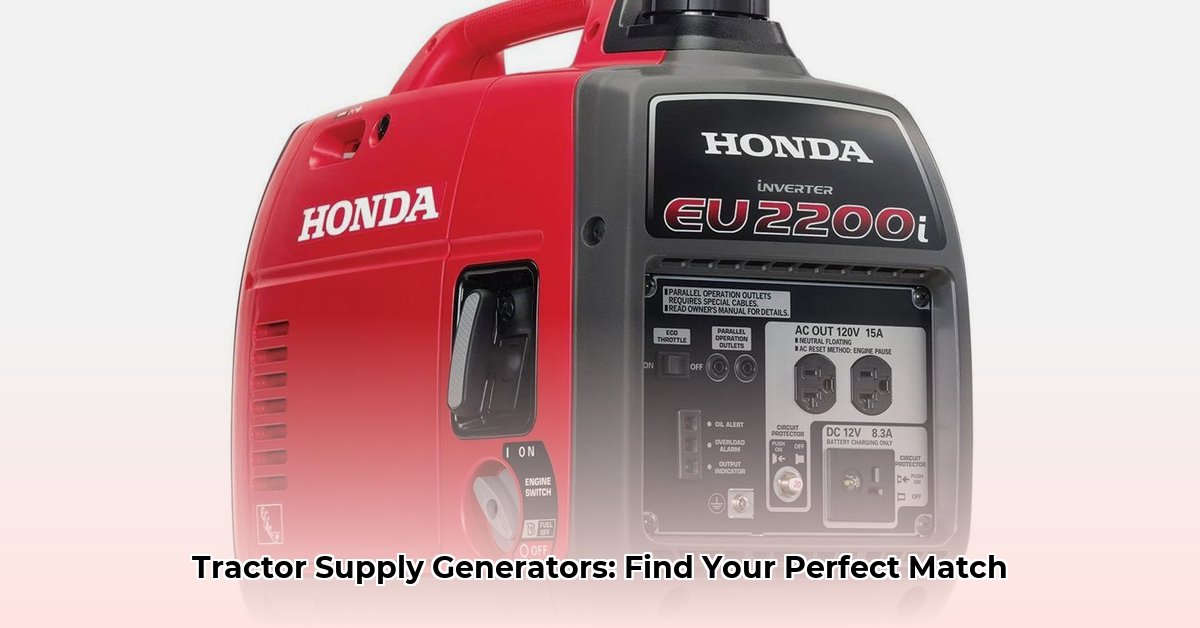
Power outages are frustrating, but having a reliable portable generator can ease the burden. Tractor Supply offers a range of options, but choosing the right one can be tricky. This guide simplifies the process, helping you find the perfect generator for your needs and budget. For more detailed information on Tractor Supply generators, check out this helpful resource.
Understanding Your Power Needs: Watts Matter
Before you start shopping, calculate your power needs. List every appliance you plan to run (lights, refrigerator, power tools) and note its wattage (found on a label). Add those wattages together. Then, add 20-30% for a safety margin to prevent overloading. This total is your minimum wattage requirement. Don't underestimate! A common mistake is buying a generator that's too small for the job. How much extra wattage do you need for your lifestyle?
Types of Portable Generators: Fuel Choices
Tractor Supply typically carries gasoline, propane, and dual-fuel generators. Each has its pros and cons:
Gasoline-powered: These are widely available and generally less expensive upfront. However, they require more maintenance (oil changes) and tend to be louder.
Propane-powered: Propane generators burn cleaner, are often quieter, and offer longer fuel storage life. However, you need to purchase and replace propane tanks.
Dual-fuel (Gas/Propane): Offering the most flexibility, these generators run on either gasoline or propane. This versatility often comes at a higher price.
Which type is best? It depends on your priorities. Gasoline might be ideal for those on a budget who don't mind occasional maintenance. Propane is a good choice for quieter operation and less maintenance. Dual-fuel works best for maximum flexibility.
Key Features to Consider: Beyond Wattage
Wattage is critical, but other factors are just as important:
Run Time: How long will it run on a full tank? This depends on the load (number of appliances) and fuel type. Longer run times are ideal for camping or extended outages. How long do you realistically need your generator to run?
Noise Level (dB): Generators can be noisy. A lower decibel (dB) rating means quieter operation; important for residential use. Noise levels can vary significantly between models – check the specification before you buy.
Portability: Consider weight, size, wheels, and handles. Ease of transport is crucial if you'll move it frequently. Weight is a major factor. How easy will it be for you to move it?
Safety Features: Look for features like automatic low-oil shutdown (prevents engine damage) and overload protection (prevents damage from running too many appliances). Safety should always be the top priority.
Choosing Your Generator: A Step-by-Step Guide
Assess your power needs: Recheck your wattage calculation. This is the foundation of your decision.
Choose your fuel type: Consider gasoline, propane, or dual-fuel based on your needs and budget.
Set a budget: Generators vary significantly in price. Setting a budget upfront will focus your search.
Consider key features: Prioritize power output, run time, noise, portability, and safety features.
Read reviews: Check online reviews and ask for recommendations from others who own generators.
Visit Tractor Supply: See the generators in person for a better understanding of their size and features and ask store staff questions. Don't hesitate to ask for help!
Generator Types Comparison Chart
| Generator Type | Advantages | Disadvantages |
|---|---|---|
| Gasoline | Widely available fuel, typically lower cost | Requires more maintenance, louder |
| Propane | Cleaner burning, longer fuel storage life | Requires propane tank replacement |
| Dual-Fuel | Flexibility (gas or propane) | Usually more expensive |
Generator Maintenance and Safety
Regular maintenance extends your generator's lifespan. Consult your owner's manual for specific instructions. General maintenance includes regular oil changes, air filter cleaning/replacement, and spark plug inspection/replacement.
Critical Safety Note: Always operate your generator outdoors in a well-ventilated area. Generator exhaust contains deadly carbon monoxide. Never run it in a garage or enclosed space.
Choosing the right portable generator depends on your individual needs. By understanding your power requirements and carefully comparing features, you can make an informed decision and power through any outage with confidence.